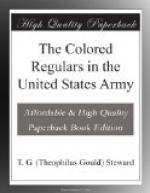Here was a religion separated from all moral principle and devoid of all softening sentiment—its most appropriate formula being, death to all heretics. Death—not to tyrants, not to oppressors, not to robbers and men-stealers—but death to heretics. It was this that equipped her Armada.
The people were too loyal and too pious to think, and so were hurled in a solid mass against the armed thought of the coming age, and a mighty nation crumbled as in a day. With the destruction of her Armada her warlike ascendancy passed and she had nothing to put in its place. She had not tillers of the soil, mechanics or skilled merchants. Business was taking the place of war all over the world, but Spain knew only religion and war, hence worsted in her only field, she was doomed.
From the days of Philip II her decline was rapid. Her territory slipped from her as rapidly as it had been acquired. Her great domains on our soil are now the seat of thriving communities of English-speaking people. The whole continent of South America has thrown off her yoke, though still retaining her language, and our troops now embarked from Port Tampa are destined to wrest from her the two only remaining colonies subject to her sway in the Western World,—Cuba and Porto Rico. With all her losses hitherto, Spain has not learned wisdom. Antagonistic to truth and liberty, she seems to sit in the shadow of death, hugging the delusions that have betrayed her, while all other people of earth are pressing onward toward light and liberty.
The struggle in Cuba had been going on for years, and in that colony of less than two millions of inhabitants, many of whom were Spaniards, there was now an army four times as large as the standing army of the United States. Against this army and against the Government of Spain a revolt had been carried on previous to the present outbreak for a period of ten years, and which had been settled by concessions on the part of the home government. The present revolt was of two years’ standing when our government decided to interfere. The Cubans had maintained disorder, if they had not carried on war; and they had declined to be pacified. In their army they experienced no color difficulties. Gomez, Maceo and Quintin Banderas were generals honored and loved, Maceo especially coming to be the hero and idol of the insurgents of all classes. And it can truthfully be said that no man in either the Cuban or Spanish army, in all the Cuban struggle previous to our intervention, has earned a loftier fame as patriot, soldier and man of noble mould than Antonio Maceo.




